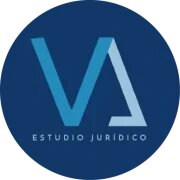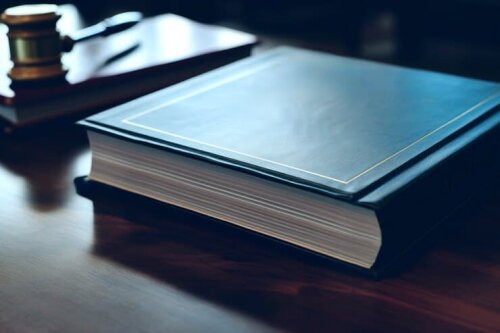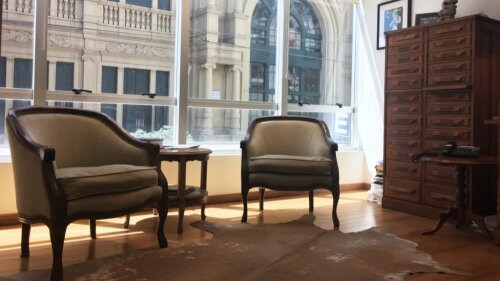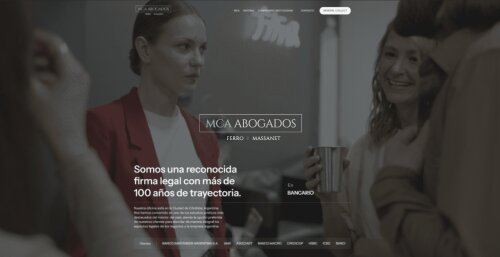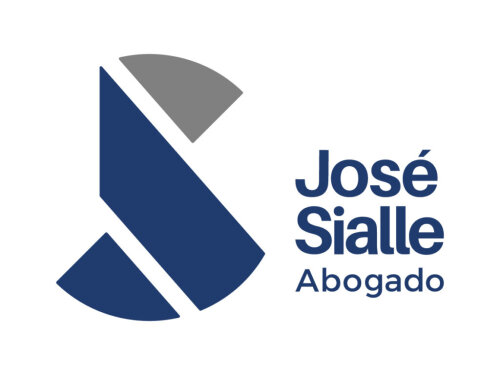Best Due Diligence Lawyers in Córdoba
Share your needs with us, get contacted by law firms.
Free. Takes 2 min.
List of the best lawyers in Córdoba, Argentina
About Due Diligence Law in Córdoba, Argentina
Due diligence is the process of gathering, verifying and analysing legal, financial, fiscal, environmental and operational information about a person, company or asset before a transaction or business decision. In Córdoba, Argentina, due diligence combines national laws that regulate corporate, tax, labour and environmental matters with provincial and municipal regulations that affect property, permits and local taxes. The objective is to identify risks, liabilities and compliance gaps so parties can negotiate price, allocate risk with contractual clauses, or decide not to proceed.
Why You May Need a Lawyer
There are many situations where you should involve a lawyer experienced in due diligence in Córdoba:
- Mergers and acquisitions - to verify corporate structure, outstanding obligations, contracts, litigation and tax exposure.
- Purchase of real estate - to confirm title, liens, zoning, outstanding municipal debts and permit compliance.
- Investment into local businesses or joint ventures - to assess regulatory approvals, shareholder agreements and capital structure.
- Financing and secured lending - to confirm collateral, registrations and enforceability of guarantees.
- Contracting suppliers or large customers - to check counterparty capacity, contracts and compliance history.
- Pre-investment compliance checks - especially for anti-corruption, anti-money laundering and sanction screening.
- Hiring or restructuring - to assess labour liabilities, collective bargaining agreements and social security obligations.
Local Laws Overview
Due diligence in Córdoba requires attention to laws and administrative frameworks at three levels - national, provincial and municipal. Key aspects include:
- Corporate and commercial law - Companies are governed by the national General Companies Law and related provisions. Provincial registries record company incorporations, powers of attorneys and certain acts. Verify the company registration with the relevant provincial Registro Público de Comercio or national registries where applicable.
- Property and land - Real estate matters are recorded at the Registro de la Propiedad Inmueble de la Provincia de Córdoba. Title searches must include liens, mortgages, easements, boundary records and any judicial or administrative embargoes. Zoning and land-use rules are set by municipal ordinances in the municipality where the property is located.
- Tax and fiscal obligations - National taxes are administered by AFIP - Administración Federal de Ingresos Públicos. Provincial taxes and stamp duties are handled by the Dirección General de Rentas de la Provincia de Córdoba. Municipal taxes and outstanding rates are enforced by each municipality, such as Municipalidad de Córdoba for the capital.
- Labour and social security - Employment relations are predominantly regulated by the Ley de Contrato de Trabajo and enforced through the Ministerio de Trabajo at the national and provincial levels. Social security and contributions are administered through ANSES and AFIP.
- Environmental and sectoral regulation - Environmental permits and liabilities are relevant for industrial sites, waste management and water use. Provincial bodies such as the Ministerio de Agua, Ambiente y Servicios Púbicos de la Provincia de Córdoba handle local requirements. Sectoral regulators - for example energy, mining or transportation - impose additional obligations and authorisations.
- Financial and anti-money laundering compliance - The Unidad de Información Financiera (UIF) sets AML rules, and Banco Central de la República Argentina supervises banking and foreign exchange controls that may affect transactions.
- Public and administrative records - Searches should include judicial records, bankruptcy filings, public contracts, permits, and any administrative sanctions.
Frequently Asked Questions
What documents are typically reviewed in a due diligence for a company?
Common documents include corporate charter and by-laws, shareholder registers, minutes of meetings, financial statements, tax filings, contracts with customers and suppliers, employment agreements, property titles, environmental permits, litigation records, insurance policies and regulatory licenses.
How long does a due diligence process usually take?
Timing depends on scope and complexity. A focused legal due diligence for a small business can take 1 to 3 weeks. Larger M&A deals, multi-site property investigations or complex regulatory reviews can take several weeks to a few months. Availability of documents and cooperation of the target party significantly affect timing.
What does it cost to perform due diligence in Córdoba?
Costs vary widely. Lawyers may charge fixed fees for narrow scope reports, hourly rates for advisory work or phased fees for comprehensive reviews. Costs depend on the depth of review, number of jurisdictions, need for on-site inspections and involvement of specialists such as tax, labour or environmental experts.
Can I perform due diligence without a local lawyer?
Basic checks can be done remotely using public registries and online resources, but a local lawyer is highly recommended to interpret records, access provincial or municipal files, identify hidden liabilities and ensure compliance with Argentine procedural and substantive rules.
How do I check property ownership and liens in Córdoba?
Title searches are performed at the Registro de la Propiedad Inmueble de la Provincia de Córdoba. A proper search should include encumbrances, mortgages, annotations of embargoes, zoning classifications and prior transfers. Lawyers often perform cadastral and municipal checks to confirm taxes and permits are up to date.
What about tax and labour liabilities discovered during due diligence?
Tax and labour liabilities can be significant. Tax audits and outstanding liabilities may be inherited in certain asset or share deals depending on structuring. Labour claims often survive transfers of business. Due diligence should estimate exposure and suggest contractual protections, such as indemnities, warranties or escrow arrangements.
How are environmental risks handled in due diligence?
Environmental due diligence includes checking permits, historical land use, contamination reports and compliance with provincial environmental regulations. When potential contamination is suspected, specialist environmental assessments and site inspections are typically required. Identified risks inform negotiation of price adjustments, remediation obligations and contractual indemnities.
Do I need to verify corporate powers and signatures?
Yes. Confirming the current board, powers of attorney and authorised signatories is essential. Provincial registries and corporate records provide originals, but notarised powers and updated minutes should be checked to ensure the counterpart has authority to execute the transaction.
What is the role of anti-money laundering checks in due diligence?
AML screening is fundamental for many transactions. The Unidad de Información Financiera rules and banking obligations require identification of beneficial owners, source of funds and checks against sanctions lists. Enhanced due diligence may be necessary for politically exposed persons or high-risk jurisdictions.
What happens if due diligence reveals serious issues?
Options include renegotiating price, adding representations and warranties, requiring escrow or guarantees, obtaining indemnities or insurance, conditioning closing on rectification of issues, or walking away from the deal. The response depends on the nature and materiality of the issues and the commercial objectives of the parties.
Additional Resources
Helpful local and national institutions and resources for due diligence in Córdoba include:
- Registro de la Propiedad Inmueble de la Provincia de Córdoba - for land and property records.
- Registro Público de Comercio o Dirección General de Personas Jurídicas de la Provincia de Córdoba - for company registrations and corporate documents.
- Dirección General de Rentas de la Provincia de Córdoba - for provincial tax information and certifications.
- AFIP - Administración Federal de Ingresos Públicos - for national tax status, fiscal burdens and registries.
- ANSES - for social security and employer contribution verifications.
- Unidad de Información Financiera - for AML rules and guidelines.
- Ministerio de Agua, Ambiente y Servicios Públicos de la Provincia de Córdoba - for environmental regulations and permits.
- Municipalidad where the asset or business operates - for municipal taxes, licenses and zoning.
- Colegio de Abogados de Córdoba - to help locate qualified local attorneys and check professional credentials.
- Banco Central de la República Argentina - for financial and foreign exchange controls affecting cross-border payments.
Next Steps
If you need legal assistance with due diligence in Córdoba, consider the following practical steps:
- Define scope - decide which areas are critical - corporate, tax, labour, property, environmental or sector-specific compliance.
- Find a local lawyer - look for experience in Córdoba transactions and the relevant subject matter. Check professional standing with the Colegio de Abogados de Córdoba and ask for references.
- Prepare a data room - assemble core documents and a list of missing items. This accelerates review and reduces costs.
- Ask key questions during engagement - expected timeline, scope, fee structure, need for specialists, deliverables and confidentiality protections.
- Agree engagement terms in writing - the engagement letter should describe scope, fees, timelines, responsibilities and confidentiality.
- Review preliminary findings - use the legal due diligence report to negotiate transactional terms, draft warranties and allocate risk.
- Plan for post-closing - include mechanisms for indemnities, escrows, remediation obligations and compliance programs where required.
Due diligence is a risk-management tool. Working with a local lawyer who understands Córdoba and Argentine law will help you identify issues early, quantify exposure and structure solutions that protect your interests.
Lawzana helps you find the best lawyers and law firms in Córdoba through a curated and pre-screened list of qualified legal professionals. Our platform offers rankings and detailed profiles of attorneys and law firms, allowing you to compare based on practice areas, including Due Diligence, experience, and client feedback.
Each profile includes a description of the firm's areas of practice, client reviews, team members and partners, year of establishment, spoken languages, office locations, contact information, social media presence, and any published articles or resources. Most firms on our platform speak English and are experienced in both local and international legal matters.
Get a quote from top-rated law firms in Córdoba, Argentina — quickly, securely, and without unnecessary hassle.
Disclaimer:
The information provided on this page is for general informational purposes only and does not constitute legal advice. While we strive to ensure the accuracy and relevance of the content, legal information may change over time, and interpretations of the law can vary. You should always consult with a qualified legal professional for advice specific to your situation.
We disclaim all liability for actions taken or not taken based on the content of this page. If you believe any information is incorrect or outdated, please contact us, and we will review and update it where appropriate.




